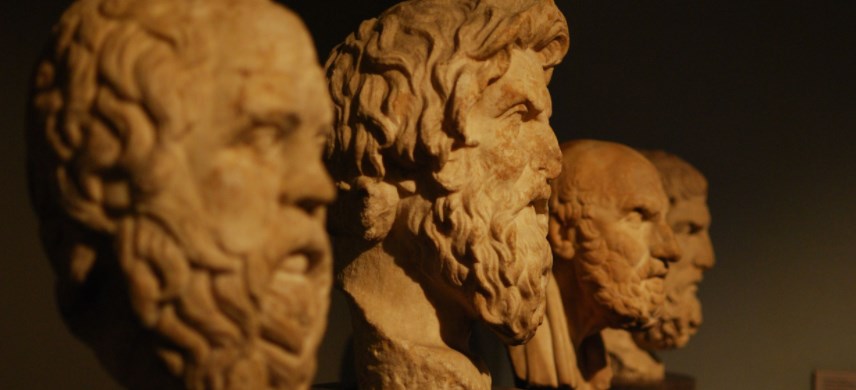[Sponsored] By Dan Yip
“Philosophy is boring and hard to understand”.
How many times have we heard this dismissal? It seems every time I carelessly mention the term “philosophy” in a conversation, or unwisely allude to it on a date, I am faced with a human-sized flash-frozen chunk of ice.
Nevertheless, I have tormented myself with philosophy books since the year 2000, for almost two decades so far. I must admit that philosophy is dry and hard to grasp, but I must also declare that philosophy’s insights shine through its dry text.

Philosophy rewards (eventually) those with the determination to solve its riddles. Otherwise, I suppose, it could not have flourished in the West for so many centuries, engaged so many intelligent scholars in life-long debates, featured so prominently in universities, and inspired so many great minds. Why philosophy?
The genesis of my interest in philosophy is embarrassingly banal. I heard that Bruce Lee had briefly read philosophy at university, and I was curious to find out what might have interested my hero. I happened to find Will Durant’s The Story of Philosophy at a nearby library, and he appealed to me because he was easier to read than any English philosopher.
From Plato to Voltaire, and from Kant to Dewey, he explained profound thoughts in clear English. Philosophy was fun. Reading Durant was different from taking philosophy courses at college that required digesting long extracts of original texts. They were no fun at all until I found help.
The classics of philosophy are rough terrain. Traversing them was as exhausting as running a marathon on soft sand. Hurdling over difficult jargon, I often stumbled and became disoriented.
I would spend hours and days trying to claw over these cryptic obstacles, but I finally learned something important that I want to share: it is important to remember that philosophy classics were all written for other philosophers to read, and of course we read many of them in translation, which normally makes them even harder to understand.

In 400BC Plato wrote in ancient Greek for other citizens of ancient Greece. Kant wrote for his intellectual contemporaries in the 18th century, not for untrained beginners like me. Desperate after trying for weeks to decrypt original philosophy classics like Plato’s “Republic”, I finally turned to secondary sources, summaries, and companion guides.
Graphic Guides, published by Icon Books, were easy to read. So were Great Ideas by Penguin Books and the Very Short Introduction series by Oxford University Press.
Within a hundred pages or so, these short treatments provided just what I needed, a simplified approach to a subject or a thinker. Gradually the difficult classics became accessible, and I even began to enjoy the originals that had tormented me for so long.
Thanks to simplified renditions, I actually began to enjoy philosophy courses. I learned to associate philosophical positions with my world outside the classroom, and I saw that the concerns of thinkers, even many centuries past, are still relevant today.
When people talk about politics and throw around terms like “justice”, “freedom”, “rights”, they use the work of philosophers, Aristotle and John Locke for example, who dealt with these terms both thoughtfully and thoroughly. Philosophy is tough, but it cuts through to the essence of a problem.

Armed with this belief, I chose Philosophy as one of my three majors at Simon Fraser University in Vancouver BC. Through four years at university I challenged a wide variety of philosophy courses, seeking to broaden my horizon and deepen my knowledge as much as my masochism could stand.
I worked through the classics of course, but I also studied contemporary philosophers who discussed ethical issues and promoted movements closer to our own time.
Coining the term “deep ecology”, Norwegian philosopher Arne Naess advocated a more complete understanding of nature, the underlying cultural background of human attitudes toward nature, and the immense value of nurturing bio-diversity. His philosophy helped lay the theoretical foundation for many environmental movements.
The American philosopher Peter Singer based his philosophical assertions on scientific research. His magnum opus, Animal Liberation, written in the 1970s, has gone far to alter general attitudes to the treatment of animals. Philosophers take action.
I returned to Hong Kong in 2008 and continued my academic pursuit of philosophy at CUHK, eventually earning an MA and attending amazing courses on Husserl and Heidegger. Not only were they conducted by leading experts, they were taught in my mother tongue, Cantonese.
Philosophy had never felt so personal to me. Last week, the Philosophy Department celebrated the MA programme’s 15th anniversary on a tram. Cruising along Queen’s Road on a tram and listening to philosophy at the same time was at once surreal and coincidental.

Perhaps the tramway and philosophy are both anachronisms, but in this age of ultra-convenience and instant information, we need to rediscover philosophy, just as we need to appreciate the trams. Travelling at a more deliberate pace, they both refresh our outlook on ourselves and on the world.
The Chinese University’s Part-time Master of Philosophy course is now accepting applicants. Click here for details.
